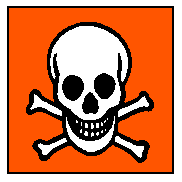International Chemical Safety Cards
| PROPARGYL ALCOHOL | ICSC: 0673 |
| PROPARGYL ALCOHOL 2-Propyn-1-ol C3H4O / CH CCH2OH Molecular mass: 56.1 CAS # 107-19-7 RTECS # UK5075000 ICSC # 0673 UN # 2929 EC # 603-078-00-X |
 |
| TYPES OF HAZARD/ EXPOSURE |
ACUTE HAZARDS/ SYMPTOMS |
PREVENTION | FIRST AID/ FIRE FIGHTING |
| FIRE | Flammable. |
NO open flames, NO sparks,
and NO smoking. |
Powder, alcohol-resistant
foam, water spray, carbon dioxide. |
| EXPLOSION | Above 33°C explosive
vapour/air mixtures may be formed. |
Above 33°C use a closed
system, ventilation, and explosion-proof electrical equipment. |
In case of fire: keep
drums, etc., cool by spraying with water. |
| EXPOSURE | |
STRICT HYGIENE! |
IN ALL CASES CONSULT A
DOCTOR! |
| INHALATION | Cough. Sore throat. |
Local exhaust or breathing
protection. |
Fresh air, rest. Refer for
medical attention. |
| SKIN | MAY BE ABSORBED! Redness. |
Protective gloves.
Protective clothing. |
Remove contaminated
clothes. Rinse skin with plenty of water or shower. Refer for medical attention. Wear
protective gloves when administering first aid. |
| EYES | Pain. Severe deep burns. |
Safety goggles, face
shield, or eye protection in combination with breathing protection. |
First rinse with plenty of
water for several minutes (remove contact lenses if easily possible), then take to a
doctor. |
| INGESTION | |
Do not eat, drink, or smoke
during work. |
Rinse mouth. Rest. Refer
for medical attention. |
| SPILLAGE DISPOSAL | STORAGE | PACKAGING & LABELLING | ||
| Collect leaking and spilled
liquid in sealable containers as far as possible. Absorb remaining liquid in sand or inert
absorbent and remove to safe place. Do NOT let this chemical enter the environment (extra
personal protection: complete protective clothing including self-contained breathing
apparatus). |
Fireproof. Separated from
strong oxidants, food and feedstuffs. Keep in the dark. Well closed. |
Do not transport with food
and feedstuffs. T symbol R: 10-23/24/25-34 S: (1/2-)26-28-36-45 UN Hazard Class: 6.1 UN Subsidiary Risks: 3 UN Packing Group: II |
||
| SEE IMPORTANT INFORMATION ON BACK | ||||
|
||||